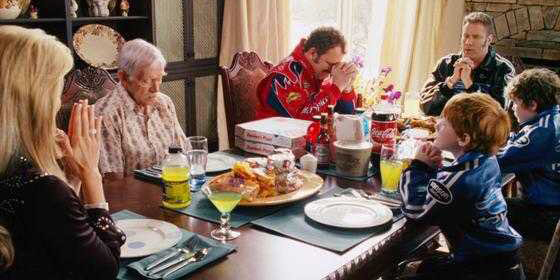In the movie Talladega Nights, race car driver Ricky Bobby (played by Will Ferrell), gathers his family for a celebratory meal after a big win. Quieting the people gathered around the family dinner table, Ricky offers a prayer, a special soliloquy in his own dialect, that hilariously pokes fun at our culture that intertwines religion with misogyny.
Dear Lord Baby Jesus, … thank you so much for this bountiful harvest of Domino’s, KFC and the always delicious Taco Bell. I just want to take time to say thank you for my family. My two beautiful, beautiful, handsome, striking sons, Walker, and Texas Ranger, or T.R., as we call him. And of course, my red hot smokin wife, Carley.

Julia Goldie Day
A few years ago, I was at a Cooperate Baptist Fellowship-sponsored retreat with the teenagers of my church and to my surprise heard some words that brought to mind the prayer of Ricky Bobby thanking God for his hot wife. The theme for the retreat was “Connections” (with God, to be clear) and the pastor was speaking about his wife. I don’t remember why he was talking about his wife, only that my ears perked up for all the wrong reasons.
The pastor was sharing his annoyance in finding his wife’s’ hair in the shower drain even though she had amazing hair and she was hot. To his credit, he did have a lot more appropriately good things to say about her, but his description of her as “hot” didn’t sit well with me. I might have let that faux pas slide until the pastor began talking about making (wink, wink), “connections” at the retreat. He asked for a teenage girl to come on the stage and then asked a teenage guy to come up. He proceeded to give the guy a bouquet of flowers and instructed him to give them to the girl. The audience of teens and adult leaders then applauded their “connection.” I was cringing, looking to my youth to gauge their reaction. They look confused.
At that point, I was livid.
I quickly made my feelings known to the retreat organizer. This behavior subjectifies women, I said, angrily. I’m not OK with this. A leader, a pastor, who is providing an example to teenagers was promoting unhealthy ideas and behavior toward women. Furthermore, he was normalizing treating women like sexual objects.
The retreat organizer was stunned, saying he would watch the tape since he was out of the room at the time and would follow up with me. Later, he found me to say I was welcome to bring the issue to the pastor myself but as the retreat organizer he would not address it — even though he did not think it was entirely appropriate.
After this frustrating interaction, worship was over and we went to breakout sessions. I went to a session for adults in which we were invited to help new churches learn more about CBF. In this meeting, a CBF state leader shared the origins of the network, explaining it was formed as folks left the Southern Baptist Convention over its fundamentalist stance on women — women were not allowed to be pastors according to Scripture and especially not senior pastors. (Churches are still being kicked out of the SBC for ordaining and blessing the leadership of women.)
“Without even thinking about editing myself, I said, ‘Except we are still calling women ‘hot’ in worship.’”
This state leader said what he likes about CBF is its acceptance of women and work with installing more women pastors in the network. And without even thinking about editing myself, I said, “Except we are still calling women ‘hot’ in worship.” Which we had all just heard ourselves.
For a moment the room was shocked into silence by my utterance. Then a woman said, “Yeah, that was awkward,” and the state leader quickly took the opportunity to move us to a less dangerous conversation.
Later that evening in a spoof skit of Jimmy Fallon writing thank you notes, a young CBF leader thanked the pastor for making us all uncomfortable about his wife’s smoking hot hair. It was funny and not funny. I wasn’t the only one who noticed, at least.
Recently the video of a pastor describing in a sermon a woman whom he “resisted” has gone viral on social media. This pastor subjectifies the woman without care for her as a person made in the image of God.
First, he describes her appearance so we will clearly know she is attractive to him, then he vilifies her as a sexual evil temptress who must be set out to destroy him. He somehow heroically resists this evil. We should be impressed.
Unfortunately, he seems unaware why his behavior is being critiqued by women and others. Sheila Gregoire says in her recent article for BNG, when you speak this way, “you tell every man in your church: ‘It’s normal to see women as objects. No one can expect more from you.’”
When the Guidepost Solutions report outlining the coverup of sexual abuse in the SBC was released last year, several of my male pastor friends posted on social media how glad they were to be a part of CBF — where we honor women in all roles in ministry and are not like the SBC. That also didn’t sit well with me. They were congratulating themselves while blind to the ongoing misogyny in their midst.
We want to be able to say we support the full leadership of women in the CBF world, but very often that’s not what we do. We want to pat ourselves on the back for occasionally allowing a woman to preach, but that’s not the same as accepting the full leadership of women in our churches. We celebrate the few women senior pastors, and rightfully so, but only because they are not the norm.
Believe the women who tell you we are not where we need to be. Read the recent report of Baptist Women in Ministry on the state of women in our network and beyond. Female pastors report they are often isolated, diminished and harassed even in our CBF network. I know I have been.
We have so much more work to do.
I was punished for sharing my disapproval in the situation I shared above and for other times I have stood up for myself. It certainly doesn’t benefit women to speak to the misogyny in our midst. Instead, we are labeled angry, arrogant and manipulative by the men who hold most of the power in our churches.
“Will you no longer allow women to be mistreated just for speaking up about being mistreated?”
Will you no longer allow women to be mistreated just for speaking up about being mistreated?
Let’s no longer choose to judge only the anger of those who speak out and dismiss the cause-injustice. Gregoire speaks of the erupting anger of women at the misguided words of the pastor in the viral video. Anger is an appropriate emotion. However, anger, especially from women, makes us uncomfortable. Let us listen to that unease by examining the harm we are subjecting women to in our churches and then work to change our behavior.
Let us see women as God does, fully human, fully divine and reflections of God. We are all created in God’s own image. Women are no more sexual than men — and our sexuality is a part of our divinely created selves. Our bodies are holy and should be treated as such. God demands it, commands it. You shall love your neighbor as yourself. As yourself, for we are truly connected to each other in the kin’dom of God.
That’s the kind of “connection” we need.
In the novel Lessons of Chemistry, the main character says: “She told him the whole story, explaining that she’d had to leave UCLA because when men rape women, they prefer women not to tell.”
In many ways, it’s not just sexual violence we prefer women not to tell. In our CBF churches we prefer women to go along with the jokes and the objectification also. And as Gregoire says, “We’re tired of being framed as the dangerous ones when we’re the ones in danger.”
Look around: Misogyny is in your church too.
Julia Goldie Day is an ordained minister within the Cooperative Baptist Fellowship and lives in Memphis, Tenn. She is a painter and proud mother to Jasper, Barak and Jillian. Learn more at her website or follow her on socials @JuliaGoldieDay.
Related articles:
Southern Baptist Convention ousts its largest church, Saddleback, for having a woman pastor

